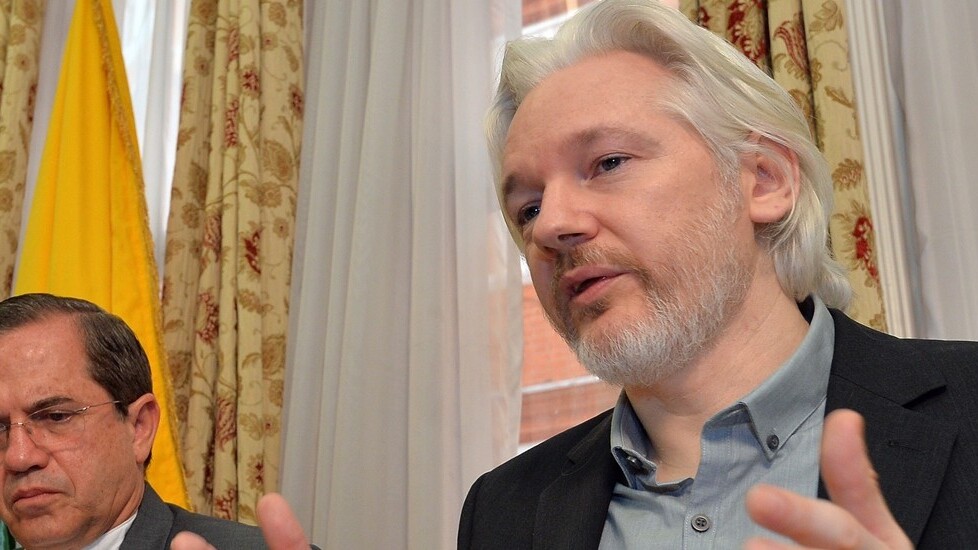
UPDATE: Shortly after Assange’s arrest, the UK government revealed that Assange is subject to an extradition request from the United States government over yet-unspecified computer crimes. This has been confirmed by the London Metropolitan Police, as well as the Home Office, which, in a statement, outlined the extradition process he will face.
UPDATE: Julian Assange has been further arrested in relation to an extradition warrant on behalf of the United States authorities. He remains in custody at a central London police station. https://t.co/rK3mtlsPBE pic.twitter.com/kipiWbflOh
— Metropolitan Police (@metpoliceuk) April 11, 2019
Assange still faces charges in the UK for breaching the terms of his bail. However, the news of the extradition request complicates things massively. Ecuador said it withdrew its extradition request on the basis that Assange would not be subject to the death penalty. Furthermore, UK law prohibits the extradition of suspects to capital punishment countries unless there are assurances that the punishment would not be used.
If America did execute him after promising not to, you can pretty much guarantee that no country would ever extradite a suspect to the States again. So, from that perspective, he’s safe.
However, you can expect Assange will vigorously fight this extradition process, using every defense and avenue of appeal available to him. I’d expect him to raise the (admittedly hellish) conditions in the American prison system, as well as argue that his demonization in the right-wing press (several Fox News commentators and Washington Times columnists have loudly called for his execution) would prevent him from having a fair trial. Whether that will wash with a judge remains to be seen.
London’s Metropolitan Police has arrested Julian Assange after Ecuador’s government withdrew his asylum.
According to a press release from the Met, Assange was arrested within Ecuador’s London Embassy, where the WikiLeaks founder has lived for almost seven years. He entered the diplomatic mission after fleeing Ellingham Hall — the Norfolk mansion of Frontline Club founder Vaughn Smith.
BREAK – Julian Assange, 47, (03.07.71) has today, Thursday 11 April, been arrested by officers from the Met Police (MPS) at the Embassy of Ecuador, Hans Crescent, SW1 on a warrant issued by Westminster Magistrates' Court on 29 June 2012, for failing to surrender to the court.
— Ross Kempsell (@rosskempsell) April 11, 2019
The release states that Ecuador’s ambassador to the UK, Carlos Abad Ortiz, invited law enforcement into the property in order to remove Assange.
Julian Assange was charged with breaching the terms of his bail conditions, which occurred when he fled to Ecuador’s tiny embassy in the affluent borough of Knightsbridge.
Failing to surrender to a court is a criminal offense in Britain, and carries stiff penalties. In total, Assange faces a year in prison or a fine. Given the massive costs incurred by the Metropolitan Police in guarding the embassy, it wouldn’t be a surprise if a judge gave him the most punitive sentence in order to set an example.
Nearly 7yrs after entering the Ecuadorean Embassy, I can confirm Julian Assange is now in police custody and rightly facing justice in the UK. I would like to thank Ecuador for its cooperation & @metpoliceuk for its professionalism. No one is above the law
— Sajid Javid (@sajidjavid) April 11, 2019
Assange is currently being held at a central London police station, and is expected to be presented before Westminster Magistrates’ Court at the earliest possible opportunity.
Sweden calling
That said, Britain isn’t the only country with its eyes on Assange.
Swedish authorities previously sought his extradition, as he was a person of interest in several sexual offenses, including rape and molestation. Assange denies all of these allegations.
In 2015, the statute of limitations expired on several of the less serious allegations, and in May 2017, the Swedish chief prosecutor dropped the rape investigation, and rescinded the arrest warrant for Assange.
This was largely because Assange had successfully frustrated the legal proceedings by placing himself beyond the reach of the Swedish justice system.
That’s not the end of the story, however, as Assange could still be charged with the more serious offense of rape. The statute of limitations on this particular allegation expires in 2020, and it’s conceivable that Assange could ultimately end up in Swedish custody.
If Sweden decides against continuing the long-running rape investigation into Assange, it’s likely he’ll be deported after his sentence (if any) in the UK is completed; either to his country of birth, Australia, or to Ecuador, where he holds citizenship.
The Ecuadorian authorities announced it granted citizenship to the WikiLeaks founder in January of this year in an unsuccessful attempt to break the diplomatic and legal gridlock surrounding this case. Clearly, that effort failed.
The biggest fear for Assange, however, is that he may be extradited to the United States.
It’d be somewhat of an understatement to say that Wikileaks’ publishing activities hasn’t exactly endeared Assange to the US Government. Hostility to WikiLeaks has been a constant theme of both the Obama and Trump administrations (although Trump once declared “I love Wikileaks” during his presidential run).
While there are no current public charges against him on the books, that could change very quickly. Former Attorney General Jeff Sessions described arresting Assange as “a priority,” and the current CIA Director Mike Pompeo has called WikiLeaks a “a non-state hostile intelligence service often abetted by state actors like Russia.”
Assange in the Ecuadorian Embassy
The eviction isn’t much of a surprise. Over the past few months, it’s become clear that Ecuador’s patience with Assange was rapidly running out.
In July, 2018, Ecuadorian President Lenin Moreno told an audience that Assange would need to “eventually” leave the country’s embassy.
It doesn’t help that Assange hasn’t exactly been the perfect house guest.
In March of this year, the country disabled Assange’s access to the Internet over a quarrel surrounding his use of social media, after several controversial tweets surrounding the Salisbury poison gas attack and the Catalonia independence referendum.
According to a statement issued by Ecuador, the move came after Assange broke a written agreement “not to issue messages that might interfere with other states.”
COMUNICADO OFICIAL | El Gobierno de Ecuador suspende las comunicaciones de @JulianAssange. pic.twitter.com/sr4kArFSxw
— Comunicación Ecuador (@ComunicacionEc) March 28, 2018
It added that Assange’s online behavior had jeopardized “the good relations [Ecuador] maintains with the United Kingdom, with the other states of the European Union, and with other nations”.
What happens next?
Julian Assange faces an unclear future. He has some serious questions to answer, at least in the UK, and quite possibly Sweden and the US.
But what’s clear is that the status quo wasn’t tenable. By all accounts, seven years holed up in the Ecuadorian Embassy, without natural light and fresh air, have taken their toll on Assange’s health. Video footage of his arrest shows a frail and haggard-looking man.
#BREAKING: @wikileaks founder Julian Assange has been arrested by police at the Ecuadorian embassy in London pic.twitter.com/4e3Xhu0Wzy
— Amichai Stein (@AmichaiStein1) April 11, 2019
It wouldn’t surprise me if, at least just a little bit, this turn of events comes as somewhat of a relief for the embattled WikiLeaks founder.
TNW Conference 2019 is coming! Check out our glorious new location, an inspiring lineup of speakers and activities, and how to be a part of this annual tech bonanza by clicking here.
Get the TNW newsletter
Get the most important tech news in your inbox each week.





